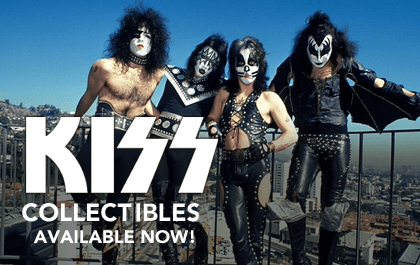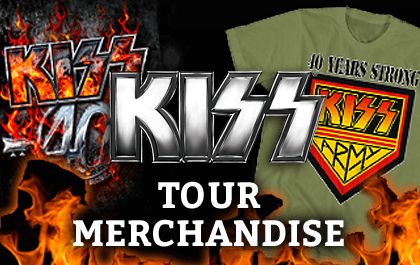Business Jet Traveler interviews Paul Stanley

By Margie Goldsmith / www.bjtonline.com/business-jet-news
Ⓒ 2018 by Business Jet Traveler, reprinted by permission.
After selling millions of records and achieving worldwide fame with Kiss in the 1970s, he was still “on a mission to find happiness.” But even then, flying privately was one thing that brought him pleasure.
Paul Stanley is best known as the cofounder, lead singer, and rhythm guitarist for Kiss, the now 45-year-old rock band, which has collected 30 gold albums and claims to have sold more than 100 million records. He has written such Kiss hits as “Love Gun,” “God of Thunder,” “Black Diamond,” and “Rock and Roll All Nite.” The group—which is known for its elaborate costumes and facial makeup—was inducted into the Rock & Roll Hall of Fame in 2014.
Performing and writing are just part of what Stanley does. He designs Kiss album covers, stages, and apparel; he created the iconic Kiss logo; and he has overseen the group’s transformation into a worldwide brand with more than 2,000 licensees. He also designs guitars that have racked up over $20 million in sales and paints portraits and abstracts that have garnered another $3 million in sales. As an actor, Stanley played the title role in The Phantom of the Opera in Toronto in 1999, earning standing ovations and helping the show post million-dollar weekly ticket sales.
Along with Gene Simmons—the only other original Kiss member who still performs with the group—Stanley is a partner in Rock & Brews restaurants, a franchise chain that has about 20 locations in the U.S. and expects to have a minimum of 50 within the next five years. His 2014 autobiography, Face the Music: A Life Exposed, was a New York Times bestseller.
Kiss’s members fly together privately. Do you own an airplane?
No. We lease or charter, depending upon the length of a tour. For myself, my flying is sporadic and it’s also on a whim or on a day’s notice. The idea of an aircraft sitting around really doesn’t make monetary sense. I’m the first person to charter for a flight. There are certain pleasures that I feel very comfortable in saying I’ve earned, and at this point in my life flying private is very much one of them.
Do you remember the first time you flew privately?
It was on a small Learjet in the ’70s. We had to go do an appearance. And as exciting as it was, I’m not a fan of cigar tubes with wings on them. That’s not to defame Lears or any of the small aircraft; it’s just that I am a big guy and I don’t want to crawl into an aircraft. I don’t want my head hitting the ceiling. I am a big fan of six-foot cabin heights.
Do you have a favorite airplane?
If it’s just me and my wife or just a few people, there’s no need to get too crazy if it’s a few hours’ flight; any of the Citation IIIs or the variants that came afterwards are terrific. But if it’s my family, I’ve always been a fan of the Embraer Legacys. I think it’s tremendous bang for the buck. I’m happy with a Falcon 50—I still think they are terrific—and you can’t beat any of the Gulfstreams. We started using them when we had a GII.
There’s so many great aircraft out there. Any of the Gulfstreams, the 200s or the 280s. The Challenger 300s or 604. I believe there’s a perfect aircraft for every use. I use a different aircraft to go to Hawaii or New York than I do to go to Vegas. When I need an aircraft, I can certainly shop for the best price per trip, but I’ve had great success with Cirrus Aviation out of Las Vegas.
You were born with microtia, a congenital condition that caused deafness and a stump in your right ear. Did kids make fun of you?
Relentlessly. I was very defensive and insecure. I just wasn’t comfortable in my own skin.
Would you say that microtia helped to shape your personality?
It certainly was at my core, and although I feel I’ve resolved most if not all of the issues, they don’t leave you. You just come to terms with them.
You’ve said that when you saw the Beatles on The Ed Sullivan Show in 1964, you saw being a rock artist as your ticket to becoming famous. Did you see fame as a way to disguise your pain about not fitting in?
I saw it as both a remedy to my pain and as being in a position where people would wish they’d been nice to me. I loved that the Beatles had long hair because it meant I could cover my ear. It was my ticket to what I thought was happiness and success. The same happened when I saw Phantom of the Opera. I found myself going, “I can do this.” Ten years later, I became the final Phantom in the Toronto run of the show.
How did Kiss begin?
It began with Gene Simmons and me being in the band Wicked Lester [which evolved into Kiss] and actually having a record deal. I remember early Kiss gigs where for two or three nights of work, after all expenses, I might have $18 or so. I got paid for what I love doing.
We wanted to be the band that we never saw—a band that gave audiences 100 percent. Too many times we saw artists who felt they were doing the audience a favor by being there.
You’ve called the makeup you’ve worn in Kiss a defense mechanism to cover up who you really were.
I think it was an extension and a magnification of either a part of our personalities or who we would like others to believe we were.





